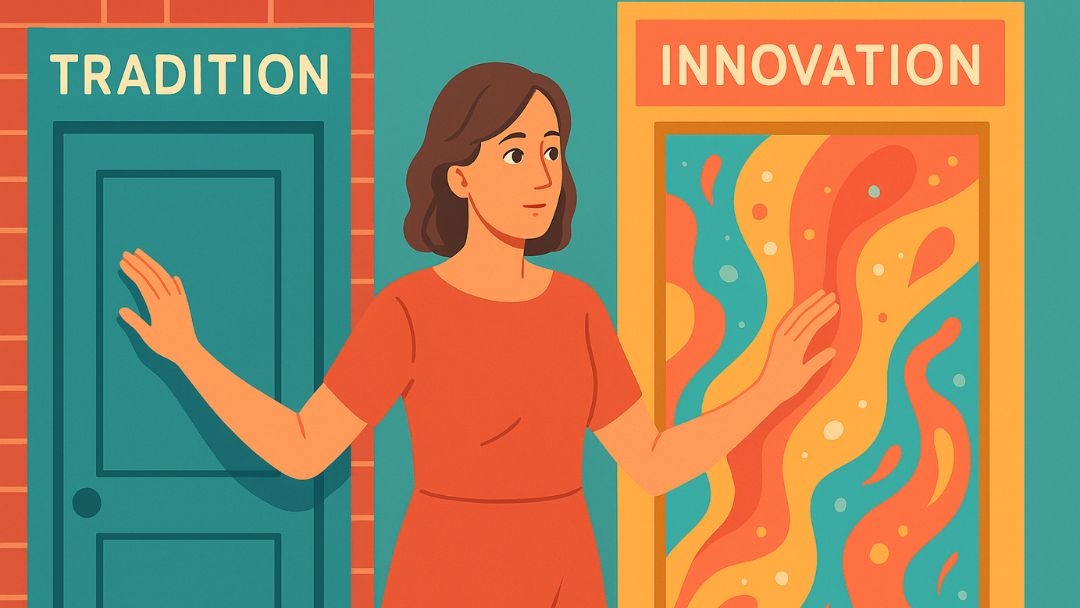How Moderate Openness Influences Entrepreneurial Style
A moderate Openness score means you don’t blindly follow tradition or jump into the unknown. Instead, you weigh your options and move forward with purpose. This article breaks down how that balance supports real-world entrepreneurial success.


Back
7 mins read
Openness to experience is one of the most influential traits in shaping entrepreneurial behavior.
It affects how people respond to uncertainty, handle change, and approach unfamiliar ideas. Whether someone thrives on novelty or prefers familiarity, their level of openness can guide everything from leadership style to business strategy.
For those with high levels of openness, these challenges can be a chance to innovate. They are fearless in going into uncharted territory or thinking outside the box for creative solutions. That is why most entrepreneurs typically score high on openness.
Conversely, individuals with lower scores on this trait may prefer to stick with traditional methods and strategies that are known to work well.
But what happens when one's openness score doesn't tilt to either extreme of the spectrum? Those with moderate openness take a measured approach to new experiences, ideas, and perspectives. They don't follow traditional business strategies blindly, nor are they impulsive when it comes to the latest trends or concepts.
With a moderate openness score, routines don't drain your energy too much, and you can handle unexpected changes without feeling completely overwhelmed. In this article, we will explore all the nuances of having a moderate openness score in the entrepreneurial world and how to maximize your performance by addressing its disadvantages and leveraging its strengths.
You may also want to read:
- How Does High Openness Impact Entrepreneurial Style?
- How Does Low Openness Impact Entrepreneurial Style?
- Best Jobs and Careers for Openness Personality Traits
- Big 5 Openness vs. Closedness: How Do These Traits Impact Learning Styles?
- Openness vs. Closedness and Leadership Style: Strengths and Communication Styles
- Big 5 Openness vs. Closedness Relationship Styles
How Does Moderate Openness Score Impact Entrepreneurial Style?

Entrepreneurs who score moderately in openness typically take a measured approach to new experiences, innovation, and established practices. They don't lean too far into being either visionaries or traditionalists.
Instead, they find a balance between old ideas and fresh approaches for a unique adaptive style. This middle-ground strategy helps these entrepreneurs reap the rewards of innovative concepts, stable systems, and standardization.
Moreover, a moderate score of openness can result in calculated risk-taking. Unlike those with an extreme level of openness who may plunge recklessly into new high-risk ventures or those on the opposite end who avoid changes at all costs, entrepreneurs under this category tend to analyze both possible rewards and potential drawbacks regarding new business opportunities.
They are capable enough to think up novel solutions, but they won't reinvent the wheel. This balanced openness generally gives them the resilience to sail through entrepreneurship's turbulent waters.
Tips for Achieving Success as an Entrepreneur with Moderate Openness

If used wisely, your moderate openness score is a major asset for you in the entrepreneurial world. Here are some tips and tricks that can help you make the most of it:
Flexible Planning:
Maintaining a sense of routine is undoubtedly valuable, but ensuring your business plans are flexible is also important. The realm of entrepreneurship can be unpredictable. However, with a moderate openness, you'll have the capability to remain true to your core objectives while still making adjustments as needed in response to changing conditions.
Adopt Incremental Innovation:
Rather than taking a radical approach to change, why not go for an incremental one? This way, you can make gradual yet effective tweaks to your products or services. Over the long run, these subtle changes will build up into meaningful advantages. An incremental approach to innovation works great for people with moderate openness scores, as it helps to avoid business-related stress and burnout.
Network Across Spectrums:
Engage with visionaries and those who have more traditional approaches in your industry. Doing so will widen your scope of business prospects and give you an enriched perception of how things work within the market.
Seek Diverse Teams:
Surround yourself with a variety of personalities. No matter what personality traits you have, diversity is a key to adaptability and efficient decision-making.
Balance in Risk Management:
Having a moderate openness score enables you to evaluate risks judiciously. Rather than steering clear of them completely or recklessly throwing yourself into the unknown, you can weigh all the pros and cons to make the best decision possible.
Openness can give you an advantageous edge, combining the thrill of new opportunities with a sense of security from familiar grounds. When paired with effective tactics and a positive attitude, this combination can be your key to success as an entrepreneur.
Cons of Having Moderate Openness as an Entrepreneur

While a moderate score in openness can bring plenty of advantages to the entrepreneurial journey, it is critical to be mindful of any potential pitfalls that could come with this.
Understanding these downsides will help entrepreneurs with moderate openness scores develop more efficient strategies moving forward. So here are some potential cons of having moderate levels of openness in the business world:
Missed Opportunities:
The potential of missing out on revolutionary ideas, markets, or technologies may be greater for entrepreneurs who don't challenge themselves to step outside their comfort zones. While high risk often comes with high rewards, people with moderate openness may believe that certain innovations or radical changes aren't worth this risk.
Lower Performance in Innovative Industries:
Innovative industries require a high level of adaptability and creativity to stay ahead. Without high openness, it may be difficult to maintain the competitive edge that is so essential in today's ever-evolving market.
Struggle with Rapid Scalability:
In certain sectors, an assertive attitude towards innovation that often comes with higher openness scores is essential for fast-paced growth and expansion. Without it, a business may struggle to reach its full potential, as its rate of progress could be limited.
Difficulty in Change Management:
In some cases, you have to act rapidly and make decisions fast. For instance, during COVID-19, entrepreneurs with high openness scores could adapt faster. A moderate openness score may undermine your ability to adapt and implement changes in an uncertain business environment.
Delayed Technological Adoption:
Those with moderate openness will take a careful and balanced approach to emerging technologies, likely lagging behind their more tech-forward competitors who may adopt sooner. However, they won't entirely shy away from such advancements either.
Gaining awareness is the first step to successful adaptation. Moderate openness entrepreneurs can be proactive in formulating strategies that capitalize on their strengths and compensate for any potential drawbacks.
Famous Entrepreneurs with Moderate Openness

Many well-known entrepreneurs show signs of moderate openness. Let’s take a look at some of the most notable examples.
Indra Nooyi:
Nooyi, the former CEO of PepsiCo, is renowned for her savvy leadership. She successfully balanced maintaining their core beverage and snack businesses while pushing ahead into developing innovative health-focused products.
Ray Kroc:
Ray Kroc may not have created the original McDonald's, but he was the driving force behind transforming it into a worldwide franchise giant. Not only did he implement strict standardization strategies to ensure that customers could always expect consistent results no matter which location they visited, but his openness to fresh ideas, like the drive-thru, allowed him to keep up with changing customer desires.
Levi Strauss:
When the iconic Levi's brand is mentioned, people tend to think of classic blue jeans immediately. Levi Strauss revolutionized denim pants by introducing rivets into pockets for added strength and durability. However, little has changed about their core product despite this groundbreaking innovation. They have maintained an almost traditional approach, with only minor alterations made throughout decades of production.
Liu Chuanzhi:
Liu, founder of Lenovo, demonstrated an impressive ability to find a balance between innovation and tradition in the tech world. While introducing computers and devices that boasted advanced features, they also remained true to classic design elements for reliability and ease of use.
Whitney Wolfe Herd:
Whitney Wolfe Herd has been a revolutionary force in the online dating world with her creation of Bumble. This platform puts women at the forefront, allowing them to take charge and make the first move. However, Bumble is based on the same concept as Tinder, which was created much earlier.
Warren Buffett:
Widely recognized as one of the most accomplished investors in history, Warren Buffett is famed for his sensible and systematic approach to investing. He keeps an open mind towards understanding new business models and venturing into unknown industries, and uses long-standing investment principles.
Kemmons Wilson:
Kemmons Wilson, the founder of Holiday Inn, revolutionized the hospitality industry by creating a chain of motels that provided consistent standards across America. Such an approach to standardization has resulted in spectacular business results.
The shining examples of these entrepreneurs demonstrate the success that can come from a balance between openness and closedness. They underline that in business, there are many solutions for success. Sometimes, it's all about finding harmony within both innovation and conservatism.
Moderate Openness Businesses and Industries

Those with moderate openness on the Big 5 Personality Test have a harmonious mix of creativity and respect for traditional business approaches. But which fields or industries are best suited to this combination? Let's explore further.
Franchising:
Franchise businesses offer a reliable and well-established approach to work with, while still providing room for regional customization and improvement. From fast food outlets to retail stores or service providers, franchisees can think creatively within the context of an established system.
Retail:
Retail, a sector rooted in tradition, allows for continual evolution. Entrepreneurs can maintain traditional sales methods while integrating the latest technology, customer service protocols, and inventory management systems into their operations.
Fitness and Wellness:
This field is rooted in long-standing traditions, but it also offers room for new workout methods, modern wellness tools, and holistic health approaches. Therefore, it perfectly aligns with a moderate openness score.
Beauty and Personal Care:
Exploring the beauty world can be a never-ending journey. From time-tested secrets to cutting-edge skincare technology. A moderate-openness entrepreneur in this niche can turn ancient recipes into modern products, utilizing current trends for their packaging and promotion.
Landscaping and Gardening:
This industry is deeply entrenched in the traditional practice of agriculture. Yet, there's always an opportunity to bring new crops, designs, or sustainable solutions into play.
Events and Celebrations:
Event planning and management is a unique opportunity to combine classic celebration customs with today's themes, technologies, and practices. Entrepreneurs with moderate openness can thrive in this industry and provide high-quality service to their clients.
Manufacturing and Production:
Innovation is undoubtedly essential in these industries, but maintaining consistency and ensuring quality control is just as important. Striking a balance between trying new things and adhering to existing practices can help create innovative and dependable products.
Success in entrepreneurship doesn’t always come from bold leaps or rigid routines. For those with moderate Openness, it often grows from steady exploration and practical insight. By trusting your balanced perspective and staying open without losing focus, you give yourself a powerful advantage in building a business that lasts.


Return to Blog






